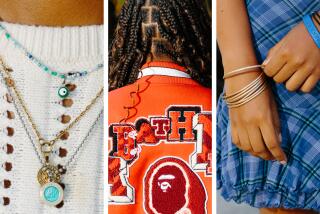Good Fashion Statement on Disabilities : * Mainstreaming the Handicapped in Ads Shows Compassion, Makes Business Sense
- Share via
The back-to-school season is truly upon us. Students in the many school districts of Orange County last week made their way back to class, and stores are filled with shiny notebooks, stacks of ruled paper and, of course, new fall clothes. It’s the advertisements for those clothes, and particularly the children modeling them, that caught our eye this year as late summer merges into early fall.
Two young boys sport brightly colored T-shirts in one national mailer. They are posed casually, smiling at the camera. One boy, standing, leans slightly against the wheelchair of the other boy. Yes, wheelchair.
In another, two school-age boys sit on a park bench, posed in polo shirts, snappy jeans and canvas shoes. They are laughing. The crutches of one boy rest against the bench, just inside the camera’s view. Crutches?
These are pictures that speak loudly to the 43 million Americans with disabilities, a significant market that major retailers have too long ignored.
And they send a clear message to everyone that people with disabilities are attractive, active and, yes, leading normal lives.
That visibly disabled children and adults are no longer a complete oddity in print and television advertisements for clothing, fast food, department stores and long-distance telephone companies is, happily, not because of legislative mandates or protracted litigation.
Instead, their debut, within the past year or so, results from a bit of corporate compassion and a lot of business sense.
Regardless of the motivation, the children in this season’s ads make a pretty picture indeed.






